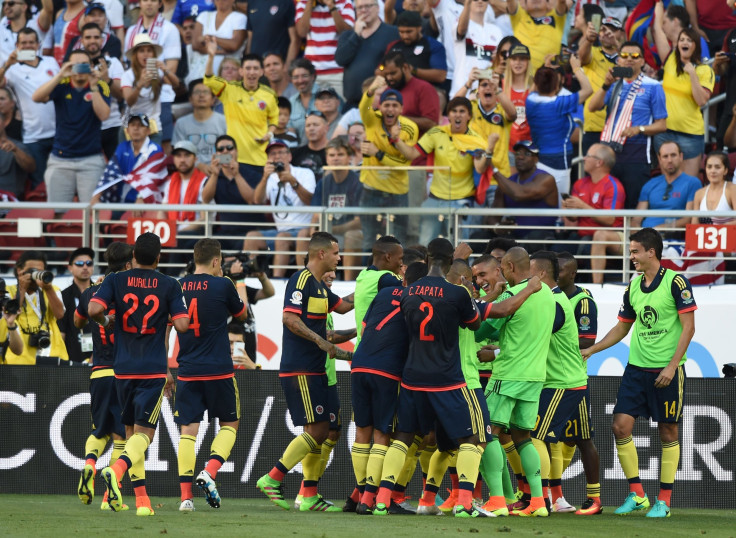Colombia 2-0 USA: James, Zapata Goals Down Hosts In Copa America Centenario Opener

SANTA CLARA, Calif. — Jurgen Klinsmann had billed the Copa America Centenario as the biggest soccer event to hit the United States in more than two decades and, on the pitch, a key chance for his side to show where they stood midway between World Cups. Yet it took less than eight minutes into the tournament for for the bubble of optimism to be soundly burst.
From a corner from the right, veteran center-back Cristian Zapata lost his opposite number Geoff Cameron in the middle and beat Brad Guzan in the U.S. net with a crisp volley from 12 yards. The large patches of yellow dotted around every part of a sold-out crowd of 67,439 at Levi’s Stadium leapt to their feet and roared with approval.
Three minutes before halftime it was those in yellow, who made it feel far from a home match for the U.S., who were celebrating once again. From Farid Diaz’s cross, DeAndre Yedlin raised his hand in his own penalty area and when the ball struck it Mexican referee Roberto Garcia pointed to the penalty spot. It was certainly on the harsher end of handball calls, and the U.S. frustration was confirmed when Colombia’s star man, James Rodríguez, coolly sent Guzan the wrong way from 12 yards.
"What do you do when you have that penalty call called against you in your home country? We’re used to getting those type off calls, even if it’s kind of close," was U.S. forward Clint Dempsey's pointed post-match assessment.
There was to be no way back in the second half. Yet in Klinsmann’s mind there was still much to be taken from the game in which on the score sheet, at least, only two set-piece goals separated his side from the team ranked third in the FIFA rankings.
“We played it even, there was absolutely no problem at all. When they went 1-0 up we kept playing and we kept the rhythm. Obviously I think the players coming out of the game, they just see that it’s the number three in the world, we can play with them we can damage them.
“There was no difference beside the two goals.”
If it was accurate to point out that the U.S. was far from steamrolled by one by one of the world’s finest, it is also true that Colombia was far from its best, yet still won comfortably on American soil. The U.S., despite enjoying the majority of possession failed to provide the intensity or sharpness to match their coach’s bold pre-tournament words.
Less than an hour into the game, the Colombian fans greeted their team’s rhythmic, pressure-free passing with a chorus of Olés. It was a galling statement of just how in control Colombia was of proceedings less than an hour into the game. The hosts of 100-year celebration of South America’s championship were being toyed with.
If that was a humbling experience for the U.S., it could yet get far worse. Losing an opening game is anything but a recipe for success in major tournament group stages and already the pressure on Klinsmann’s side is intense, with an unthinkable early exit now very much a possibility. If the U.S. can comfort itself with the fact that a meeting with Colombia is on paper its toughest contest in Group A, it will also know that there is now no room for error going forward. If not a must-win, Tuesday’s clash with Costa Rica is certainly a must not lose.
“Obviously we are with our back against the wall, we need three points against Costa Rica,” Klinsmann said afterward.
Friday’s match should have left Klinsmann with some serious thinking to do before then. The U.S. went with an expected lineup in a 4-3-3 shape, featuring just two changes, at full-back, to the side that beat Bolivia 4-0 in their final warm-up game.
Yet from the moment it fell behind, there was scant sign of the U.S. possessing the urgency or cutting edge to claw its way back into the game. Klinsmann’s men may have been in charge of the ball, something which would in theory satisfy the German coach’s repeated calls for his team to play matches on its terms. However, it was possession that was allowed by Colombia.
José Pekerman’s side, quarterfinalists at the last World Cup, was sure enough of its ability to handle an attack led by 33-year-old Dempsey. And it was happy, too, to play on the counter-attack, using the pace of Chelsea winger Juan Cuadrado, skill of Real Madrid’s James, who later limped out of the game, and predatory qualities of Milan striker Carlos Bacca.
And Bacca could have made the score more emphatic, when put clean through on goal in the second half and beating Guzan but finding the crossbar rather than the net with his goal. For the U.S., which to its credit showed more attacking intent midway through the second half, the only clear openings arrived from set-pieces.
Dempsey was the man most likely to make something happen. But twice he was denied by last-gasp interventions. First his header from a corner was cleared off the line by Sebastian Perez and then his well-struck free-kick was repelled by a diving save from Arsenal stopper David Ospina.
For U.S. fans the loudest cheer of the night came when the teenager billed as the next big thing in American soccer, Christian Pulisic, came off the bench. Given the lack of inspiration displayed by the U.S. attack on Friday, there will now be even more pressure on Klinsmann to start his 17-year-old prodigy in what is now a vital clash with Costa Rica.
© Copyright IBTimes 2024. All rights reserved.





















